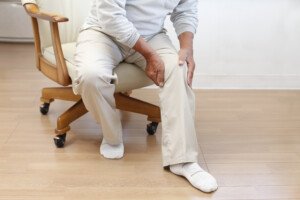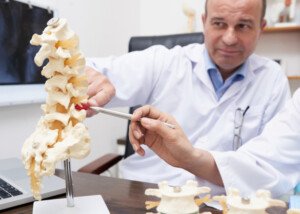
Should you rely entirely on what a bone scan shows if you suspect that your total knee replacement has “loosened” or failed?
It is important to discuss this with your orthopedic surgeon.
A failed total knee replacement (TKR) can produce symptoms that are strikingly similar to those caused by other conditions such as nerve damage or spinal stenosis (narrowing of the spinal canal).
When a patient who’s had a total knee replacement presents to a doctor with complaints of knee pain, swelling, warmth and instability in walking, one consideration might be that the implants/prostheses have loosened, or have “failed.”
The doctor may then order a bone scan to see if anything suspect shows up — but how effective is this tool?
“A bone scan is a study that detects changes in bone metabolism and is nonspecific in providing results,” says orthopedic surgeon David Fisher, MD, Director of the Total Joint Center at the Indiana Orthopedic Hospital.
“Increased bone activity can be caused by trauma, infection, prosthetic loosening, metabolic bone disorder.
Failed total knees may or may not stimulate a bone response depending on the cause of failure.”
Causes of Failed Knee Replacements
• Friction. The joint surfaces rub against each other, causing wear and tear over time of the implant surface.
• Infection. Bacteria can flourish on the metal and plastic components.
• Stiffness. Reduced range of motion can result in a functional deficit.
• Instability. The patient may feel that the knee might “give way” when walking. This indicates that the soft tissue that surrounds the joint is just too weak so support body weight.
• Improperly placed implants. This can cause instability.
• Fracture. A fracture around the joint can lessen stability.
Second Opinion of Bone Scan Can Be Useful
“So a bone scan is not usually necessary to determine problems with a total knee replacement and can miss many causes,” says Dr. Fisher.
 Dr. Fisher has been involved in research and development of total hip and knee implants and has had numerous articles published in professional journals, and has participated in many research projects.
Dr. Fisher has been involved in research and development of total hip and knee implants and has had numerous articles published in professional journals, and has participated in many research projects.
 Lorra Garrick has been covering medical, fitness and cybersecurity topics for many years, having written thousands of articles for print magazines and websites, including as a ghostwriter. She’s also a former ACE-certified personal trainer.
Lorra Garrick has been covering medical, fitness and cybersecurity topics for many years, having written thousands of articles for print magazines and websites, including as a ghostwriter. She’s also a former ACE-certified personal trainer.
.









































